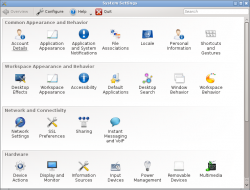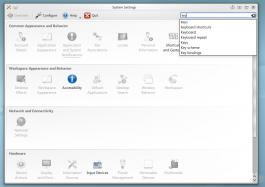System Settings/da: Difference between revisions
Created page with ''''Systemindstillinger''' har en søgefunktion, som hjælper dig med at finde en indstilling. Skriv bare et nøgleord i ''Søg'' feltet i værktøjslinjen og Systemindstillinger ...' |
Created page with 'Søg efter "key"' |
||
| Line 19: | Line 19: | ||
:{|class="tablecenter" | :{|class="tablecenter" | ||
|[[Image:Systemsettings-search.png|thumb|265px| | |[[Image:Systemsettings-search.png|thumb|265px|Søg efter "key"]] | ||
|} | |} | ||
==Categories== | ==Categories== | ||
Revision as of 17:35, 7 September 2010
Template:I18n/Language Navigation Bar
Hovedpunkter
- Kontrolcenter for globale indstillinger af KDE-platformen
- Praktisk tilpasning og håndtering af skrivebordet et sted
- Søgefunktion hjælper med at finde sandsynlige indstillinger
Søgning
Systemindstillinger har en søgefunktion, som hjælper dig med at finde en indstilling. Skriv bare et nøgleord i Søg feltet i værktøjslinjen og Systemindstillinger vil vise moduler, som indeholder dette nøgleord og gemme dem, der ikke gør. Systemindstillingers moduler kan også startes ved hjælp af KRunner.
Categories
Common Appearance and Behavior
Account Details

Configure your user information, password and paths. You can also configure your Social Desktop providers. Application Appearance

Configure your applications style, colors, icons, fonts and emoticons.
Hardware
Input Devices

Configure your keyboard, mouse and joystick.
System Administration
Login Screen

Configure the login manager (KDM). Startup and Shutdown

Configure your system behavior when starting up or shutting down.
Mouse Gestures
- KDE SC version 4.4.4
The place where you start is ""
Enabling mouse gestures
In the bottom left corner of the window there is a button. Make sure that the checkbox is checked. Set the timout as you see fit. The mouse button might be different for you, I chose 3 for using the right mouse button. If you want input actions to be enabled automatically, check the "Start the input Actions daemon on login" above.
Creating the Mouse gestures actions group
Right click on the left pane (in an empty area under the list of action groups) and choose , rename that group to "Mouse Gestures" and check the checkbox attached to its name.
Creating a new mouse gesture
From now on I will assume that the new group is called "Mouse Gestures". Right click on and choose (here there are three options but I didn't manage to work with "Send Keyboard Input") using "Command/URL" or "D-Bus Command" you will need to create a gesture and bind an action to it.
To create the gesture
Click on your and select the tab. in the bottom of the screen there is an button (click it). In the box that just opened draw your gesture using the left mouse button.
To bind an action
if you chose simply enter that command/url under the tab at the field.
Examples using Command/URL
Close window
This command will let you close the next window you mouse click on. Note: wmctrl may not support your Window Manager.
Command/URL: wmctrl -c :SELECT:
to close the active window
Command/URL: wmctrl -c :ACTIVE:
Examples using D-Bus
If you chose D-Bus, here are few examples.
Finding out what to fill where, is done with the help of the "Launch D-Bus Browser", using that browser you can find what method you wish to call in what application object. Using D-Bus we need to fill some fields, the field name will be regular and the content italic.
Runner
This will display the Runner dialog.
Remote Application: org.kde.krunner
Remote Object: /App
Function: org.kde.krunner.App.display
Audacious next/previous/pause/play/stop/repeat track
Remote Application: org.mpris.audacious
Remote Object: /Player
Function: org.freedesktop.MediaPlayer.Next (replace Next with Prev/Pause/Stop/Play/Repeat)
Audacious PlayPause track
If not playing will play, if playing will pause.
Remote Application: org.mpris.audacious
Remote Object: /org/atheme/audacious
Function: org.atheme.audacious.PlayPause
display the actions pop-up. (I am using that to search and translate words)
Remote Application: org.kde.klipper
Remote Object: /klipper
Function: org.kde.klipper.klipper.showKlipperManuallyInvokeActionMenu


